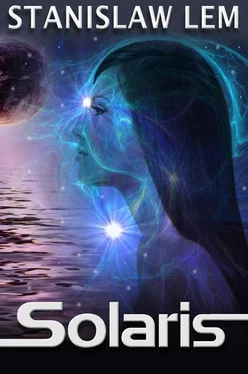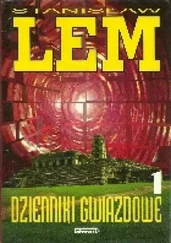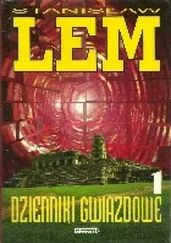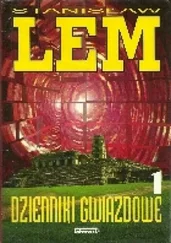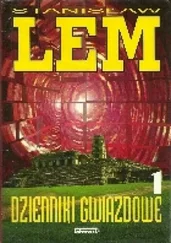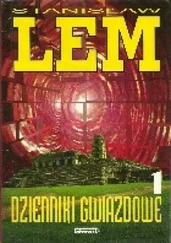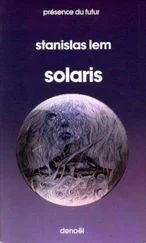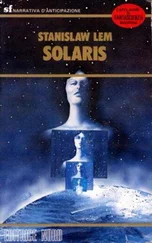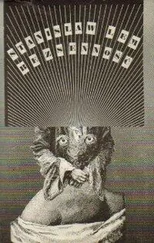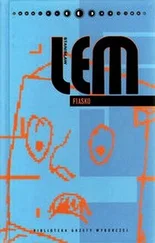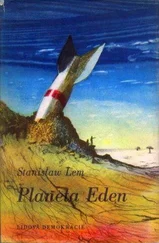The image was fading already, and for a moment that lasted I don’t know how long I forgot about the Station, the experiment, Harey, the black ocean, everything; I was filled with an instantaneous certainty that those two men, who were no longer with us, infinitely small and turned to dust, had been equal to anything they had encountered, and the calm that resulted from this realization annihilated the formless crowd surrounding the arena in mute expectation of my defeat. Along with a double click of the apparatus being turned off, the artificial light exploded into my eyes. I squinted. Sartorius was gazing at me inquiringly, still in the same pose; Snaut, his back to the other man, was busy with the equipment, seemingly deliberately clattering the clogs he wore loosely on his feet.
“Do you think it was successful, Dr. Kelvin?” Sartorius asked, his repulsive nasal voice breaking off.
“Yes,” I said.
“Are you sure?” Sartorius responded with a hint of surprise or even suspicion.
“Yes.”
The certainty and brusqueness of my reply temporarily threw him off balance with his stiff solemnity.
“Oh… Very well…,” he mumbled, and looked around as if he didn’t know what to do now. Snaut came up to my chair and started unwinding the bandage.
I got up and walked around the room; in the meantime Sartorius, who had disappeared into the darkroom, came out with the film already developed and dried. The wavering lines with their whitish zigzags covered several yards of tape, like some kind of mold or cobweb extending along the shiny black ribbon of celluloid.
I no longer had anything to do, but I didn’t leave. The other two men had entered the tape into the oxidized head of the modulator; Sartorius had taken a last look at the end of it, frowning mistrustfully, as if he were attempting to decipher what was contained in those shaky lines.
The rest of the experiment was not to be seen. I only knew what was happening when they stood at the instrument consoles by the wall and turned on the appropriate apparatus. The current sprang to life with a faint bass hum in the coil casing beneath the armored floor, and then there were just the lights in the vertical glass tubes of the indicators moving downwards to show that the great tube of the X-ray cannon was dropping down the vertical shaft and coming to rest in its open mouth. At this point the lights stopped at the lowest levels of the scale and Snaut began to crank up the voltage till the indicators, or more accurately the white bars that represented them, fluttered and made a half-turn to the right. The noise of the current was barely audible. Nothing was happening; the drums containing the film revolved beneath their cover so even that was out of sight, and the footage counter ticked softly like the workings of a clock.
Harey gazed now at me, now at them, from over her book. I went up to her. She gave me a quizzical look. The experiment was ending now; Sartorius slowly approached the conical top of the machine.
“Can we go?” Harey mouthed at me. I nodded. She got up. Without saying goodbye to anyone — I would have found it too ridiculous — I walked past Sartorius.
The high windows of the upper corridor were filled with a sunset of exceptional beauty. It wasn’t the usual cheerless tumescent red, but every possible shade of pink, beneath a luminous mist that seemed sprinkled with the finest silver. The leaden, irregularly undulating black of the ocean’s endless plain seemed to respond to this mild aura with a spume that gave off a soft, dirty purple reflection. It was only at its very zenith that the sky was fiercely ruddy.
All at once I came to a halt in the middle of the downstairs corridor. I couldn’t bear to think that once again we’d be stuck in our cabin open to the ocean, like in a prison cell.
“Harey,” I said, “you know… I wouldn’t mind swinging by the library. Would that be OK…?”
“Sure, I’d be glad to. I could look for something to read,” she said, with somewhat artificial animation.
I sensed that since the day before there was an unfilled gulf between us and that I ought to show her a least a little warmth; but I was overcome by complete apathy. I don’t know what would have had to happen for me to be shaken out of it. We went back along the corridor, then down a ramp to a small vestibule. Here there were three doors, and between them flowers as if in display cabinets behind crystal glass panes.
The middle door, which led to the library, was lined on both sides with bulging artificial leather which I tried not to touch as I went in. Inside it was a little cooler in the large circular space under the pale silver ceiling with its stylized suns.
I ran my hand across the backs of the series of solaristic classics, and I was about to take down the first volume of Giese, the one with the engraving under tissue paper on the title page, when I unexpectedly found Gravinsky’s small-format book, which I’d overlooked the previous time.
I sat down on an upholstered chair. It was completely quiet. A few feet away from me Harey was flipping through some book. I could hear the faint rustle of the pages beneath her fingers. Gravinsky’s compendium, which was most often used in school as a simple crib, was an alphabetically arranged collection of solaristic hypotheses, from Abiological to Zoo-degenerative. The compiler, who I don’t think had ever seen Solaris, had plowed through every monograph, expedition logbook, fragmentary text and interim report; he’d even found quotations in the works of planetologists who studied other globes, and provided a catalogue that was somewhat terrifying in the brevity of its formulations, since some of them veered into inconsequentiality, deprived of the subtle complexity of thought that had accompanied their inception. Though in fact the whole, encyclopedic in intention, had ended up rather having curiosity value only; the book had been published twenty years before, and in the meantime a mountain of new hypotheses had appeared, by now too numerous to be contained in a single volume. I looked over the alphabetical index of authors, which was like a list of the fallen — very few of them were still alive, and I don’t think a single one was still active in the field. This entire treasury of thought, branching off in every direction, left the impression that one of the hypotheses simply had to be correct, that it wasn’t possible reality should be entirely other than the myriad propositions hurled at it. Gravinsky had prefaced the whole with an introduction in which he divided the preceding almost sixty years of Solaris studies into periods. In the first, dating from the initial exploration of the planet, no one was really consciously proposing hypotheses yet. At that time it was assumed, intuitively as it were, on the basis of “common sense,” that the ocean was a lifeless chemical conglomerate, a monstrous mass of jelly covering the globe, which produced extraordinary formations as a consequence of its “quasi-volcanic” activity, and through self-generating automatic processes stabilized its irregular orbit, just as a pendulum maintains an unchanging plane once set in motion. True, only three years later Magenon declared the living nature of the “gelatinous machine,” though Gravinsky dated the period of biological hypotheses as beginning only nine years afterwards, when Magenon’s previously isolated notion began to gather more and more supporters. The subsequent years abounded in theoretical models of the living ocean, all highly complex and based on biomathematical analyses. The third period involved the collapse of what had hitherto been largely monolithic opinion on the part of scholars.
A multiplicity of schools appeared, that often fought furiously with one another. It was the time when Panmaller, Strobla, Freyhouss, le Greuill, and Osipovich were active; Giese’s entire legacy was subject to devastating critique. It was at that time there appeared the first atlases, catalogues, stereoscopic photographs of asymmetriads, which previously had been regarded as unexaminable — the turning-point came with new remote-controlled mechanisms that were dispatched into the stormy hearts of the giants, which threatened to explode at any moment. At this point, in the margins of the raging discussions, there began to appear isolated, scornfully ignored minimalistic hypotheses suggesting that even if the much-trumpeted “contact” with a “rational monster” were not made, an examination of the hardening mimoid cities and balloon-like mountains thrown up and subsequently swallowed by the ocean was still likely to produce valuable chemical and physio-chemical knowledge and insights into the structure of giant molecules; but no one even engaged the proponents of such ideas in debate. After all, it was a period that saw the appearance of still current catalogues of typical metamorphoses, or Franck’s bioplasmic theory of mimoids, which, though it was abandoned as false, remained a magnificent example of intellectual panache and logical construction.
Читать дальше
